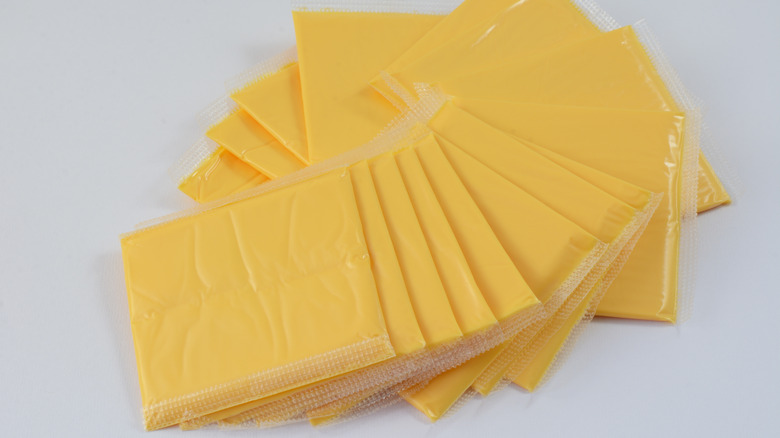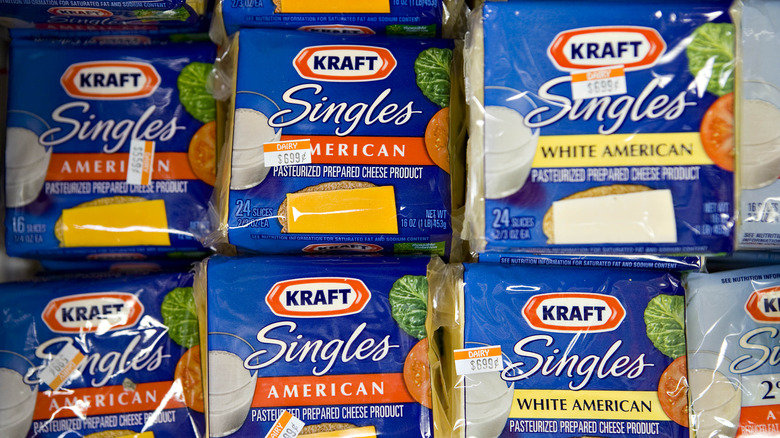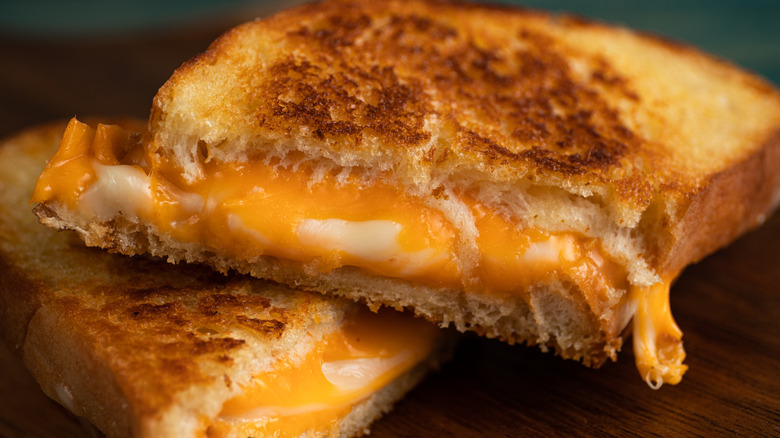You Should Reconsider Your Opinion On Processed Cheese
Consumers worldwide have grown increasingly health conscious and more focused on the clean sourcing and production of food. This demand has forced retailers to adapt, and in order to compete, provide transparency about the food's journey to store shelves. As a result, we now see industry buzzwords on food labels and advertisements, like organic, natural, eco-friendly, farm-to-table, etc.
Lately, folks have looked askance at processed foods, like the classic American cheese squares we've all known since childhood (think Kraft Singles). And sales of these processed cheeses have been steadily declining over the past few years, and according to Vox, much of this is due to health-conscious Millennials. Many have the reflexive notion that processed cheese is of poor quality, its nutrition questionable, and that it and its ilk are the ugly stepchildren of rampant capitalism.
While jumping on this bandwagon is tempting, doing so might be a bit short-sighted, at least when it comes to processed cheese. Once you understand this ingenious creation and its indispensable culinary value, you might just change your mind and even fall in love with this American staple.
Innovative origins
In the early 20th Century, Canadian-born James Kraft, who was living in Chicago, began experimenting with ways to make cheese last longer and bring it to millions of Americans, which was unheard of back then (via Thrillist). According to Mental Floss, by "shredding refuse cheddar, re-pasteurizing it, and mixing in some sodium phosphate, Kraft produced the strange wonder we now know as American process cheese." It was an instant success, and in addition to becoming something found in nearly all American households, Kraft was able to supply 6 million pounds of this uniquely processed cheese to soldiers in WWI (via Business Insider). Decades later, it would also help support the allied troops in the second World War.
Many people arrogantly claim that processed cheese is not real cheese, which is not entirely true. As Bon Appétit tells us, processed cheese is actually about 50% real cheese mixed with some other ingredients like salt, dyes, preservatives, and emulsifiers, among others. These other ingredients allow it to be an extremely consistent product with a long shelf life; in fact, some processed cheeses don't even require refrigeration.
A culinary winner
In her editorial, Food & Wine author Stacey Ballis, admonishes us about becoming too snobbish about processed cheese, declaring "American cheese is, quite simply, my culinary friend." Whether using Kraft or Velveeta, American cheese is always her first choice whenever a gooey cheese is needed. She believes that when it comes to making an excellent grilled cheese sandwich or cheeseburger, it is definitely the best option. Getting a bit poetic, she writes, "Where other cheeses become their own separate melted layer that sit sweating oil droplets atop a patty, American melts in a way that fuses into the meat itself, draping over every crevice and crater, creating a new independent food that is simply the essence of a cheeseburger."
Bon Appétit reminds us that there is a time and place for everything, and just like we sometimes choose a plain lager instead of a craft IPA, we should feel free to sometimes pick a processed American cheese over an artisanal one. According to the BBC, it has been challenging for artisanal cheesemakers in the U.S. to get the same acclaim for their products as those European countries. But this is changing, however, and American gourmet cheeses are starting to turn heads, winning international awards, and the like.
So before we completely discard American processed cheese, let us remind ourselves of its ingenious character and indispensable value. After all, it helped our soldiers defeat tyranny in both world wars, so who knows where we'd be without it!


